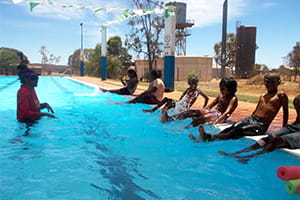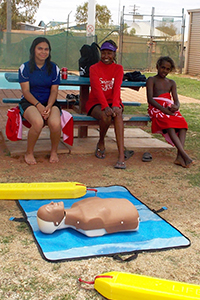Vital swimming and water safety lessons for Burringurrah kids
 Children in regional communities often miss out on the benefit of school swimming lessons, mainly due to a lack of swim instructors to run these programs in regional areas. Royal Life Saving WA is trying to solve this problem, by making sure there are swimming instructors available to lead these lessons for regional children.
Children in regional communities often miss out on the benefit of school swimming lessons, mainly due to a lack of swim instructors to run these programs in regional areas. Royal Life Saving WA is trying to solve this problem, by making sure there are swimming instructors available to lead these lessons for regional children.
The latest National Drowning report highlighted the fact that 57% of WA's drowning deaths happened outside the metro area in 2019-20, with people 3.8 times more likely to drown in regional and remote areas of WA. When it comes to children's drowning statistics Aboriginal children drown at a rate two and a half times that of non-Aboriginal children in our state. The provision of swimming and water safety programming in remote Aboriginal communities is therefore crucial as we work to turn these figures around.
Recently 14 children took part in swimming lessons at the Burringurrah Remote Aboriginal Swimming Pool, thanks to the involvement of recently qualified instructor Renee Arnold. Renee is the partner of Burringurrah Pool Manager Jamie O’Donohue, and decided to take on her swim instructor training to help fill a much needed skills shortage in the region.
Jamie says the children took part in stage two and four lessons, and did an amazing job learning new swimming and water safety skills. But the learning didn’t stop in the pool, with Jamie also teaching water safety classes for the local school students. Two of the high school students, Destiny and Ashley, even took part in CPR training.
Royal Life Saving WA Senior Manager Education, Trent Hotchkin, says it’s great to see the Burringurrah children learning these vital skills. “We’re pleased to be able to ensure kids in regional WA have access to vital swimming and water safety lessons. No children should miss out on learning these skills due to their location, and ensuring all Western Australian children learn to Swim and Survive is one of the most important investments we can make to prevent drowning.”
You can read more about our work in regional and remote WA at the link below.
